In eukaryotes the nor - Study guides, Class notes & Summaries
Looking for the best study guides, study notes and summaries about In eukaryotes the nor? On this page you'll find 272 study documents about In eukaryotes the nor.
Page 2 out of 272 results
Sort by
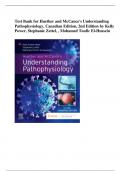
-
Test Bank for Huether and McCance's Understanding Pathophysiology, Canadian Edition, 2nd Edition by Kelly Power, Stephanie Zettel, , Mohamed Toufic El-H
- Exam (elaborations) • 370 pages • 2024
-
- $19.89
- 1x sold
- + learn more
Test Bank for Huether and McCance's Understanding Pathophysiology, Canadian Edition, 2nd Edition by Kelly Power, Stephanie Zettel, , Mohamed Toufic El-Hussein Table of Contents PART ONE: BASIC CONCEPTS OF PATHOPHYSIOLOGY Unit 1: The Cell 1. Cellular Biology 2. Genes and Genetic Diseases 3. Epigenetics and Disease 4. Altered Cellular and Tissue Biology 5. Fluids and Electrolytes, Acids and Bases Unit 2: Mechanisms of Self-Defense 6. Innate Immunity: Inflammation and Wound Healing ...
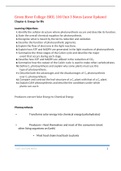
-
Green River College: BIOL 100 Unit 3 Notes Latest Updated,100% CORRECT
- Class notes • 116 pages • 2023
-
- $16.99
- 1x sold
- + learn more
Green River College: BIOL 100 Unit 3 Notes Latest Updated Chapter 6: Energy for life Learning Objectives: 1. Identify the cellular structure where photosynthesis occurs and describe its function. 2. State the overall chemical equation for photosynthesis. 3. Recognize what is meant by the terms reduction and oxidation. 4. Describe the function of photosynthetic pigments. 5. Explain the flow of electrons in the light reactions. 6. Explain how ATP and NADPH are generated in the light reac...
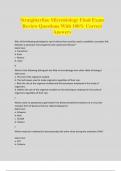
-
Straighterline Microbiology Final Exam Review Questions With 100% Correct Answers
- Exam (elaborations) • 39 pages • 2024
- Available in package deal
-
- $14.49
- + learn more
Straighterline Microbiology Final Exam Review Questions With 100% Correct Answers Who of the following developed a set of criteria that could be used to establish a causative link between a particular microorganism and a particular disease? Select one: a. Fracastoro b. Koch c. Pasteur d. Lister b Which of the following distinguish the field of microbiology from other fields of biology? Select one: a. The size of the organism studied. b. The techniques used to study organisms regard...
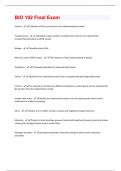
-
BIO 102 Final Exam Latest Questions With Passed Solutions!!
- Exam (elaborations) • 17 pages • 2024
- Available in package deal
-
- $7.99
- + learn more
Science - Collection of facts and a process for understanding the world Pseudoscience - Individuals make scientific-sounding claims that are not supported by trustworthy,methodical scientific studies Biology - Scientific study of life What can science NOT answer - The existence of God, understanding of beauty Hypothesis - Proposed explanation for observed phenomena Theory - Hypothesis for natural phenomena that is exceptionally well supported by data Control - The attempt to minimize any ...
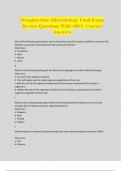
-
Straighterline Microbiology Final Exam Review Questions With 100% Correct Answers
- Exam (elaborations) • 39 pages • 2024
- Available in package deal
-
- $14.49
- + learn more
Straighterline Microbiology Final Exam Review Questions With 100% Correct Answers Who of the following developed a set of criteria that could be used to establish a causative link between a particular microorganism and a particular disease? Select one: a. Fracastoro b. Koch c. Pasteur d. Lister b Which of the following distinguish the field of microbiology from other fields of biology? Select one: a. The size of the organism studied. b. The techniques used to study organisms regard...
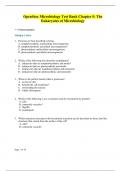
-
OpenStax Microbiology Test Bank Chapter 5: The Eukaryotes of Microbiology
- Exam (elaborations) • 14 pages • 2024
- Available in package deal
-
- $20.00
- + learn more
OpenStax Microbiology Test Bank Chapter 5: The Eukaryotes of Microbiology * = Correct answer Multiple Choice 1. Protozoa are best described as being: A. nonphotosynthetic multicellular microorganisms B. nonphotosynthetic unicellular microorganisms* C. photosynthetic multicellular microorganisms D. photosynthetic unicellular microorganisms 2. Which of the following best describes zooplankton? A. eukaryotes that are nonphotosynthetic and motile* B. eukaryotes that are photosynthet...
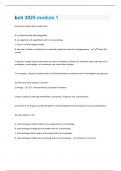
-
bch 3025 module 1 Questions With Correct Answers
- Exam (elaborations) • 8 pages • 2024
- Available in package deal
-
- $7.99
- + learn more
A dynamic steady state results when A. a molecule stops being degraded. B. an organism is at equilibrium with its surroundings. C. there is no net energy transfer. D. the rate of intake or synthesis of a molecule equals the rate of its disappearance - Choice D is correct. A dynamic steady state results when the rate of synthesis or intake of a molecule equals the rate of its breakdown, consumption, or conversion into some other product. For example, a dynamic steady state in the blood ma...
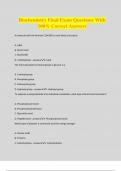
-
Biochemistry Final Exam Questions With 100% Correct Answers
- Exam (elaborations) • 109 pages • 2024
- Available in package deal
-
- $17.49
- + learn more
Biochemistry Final Exam Questions With 100% Correct Answers A molecule with the formula C10H18O is most likely to be a(an) A. Lipid B. Amino Acid C. Nucleotide D. Carbohydrate - answerA. Lipid The most abundant functional group in glucose is a A. Carbonyl group B. Phosphate group C. Carboxylate group D. Hydroxyl group - answerD. Hydroxyl group To separate a polynucleotide into individual nucleotides, what type of bond must be broken? A. Phosphodiester bond B. Phosphoanhydride bond ...
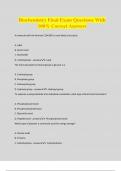
-
Biochemistry Final Exam Questions With 100% Correct Answers
- Exam (elaborations) • 109 pages • 2024
- Available in package deal
-
- $16.49
- + learn more
Biochemistry Final Exam Questions With 100% Correct Answers A molecule with the formula C10H18O is most likely to be a(an) A. Lipid B. Amino Acid C. Nucleotide D. Carbohydrate - answerA. Lipid The most abundant functional group in glucose is a A. Carbonyl group B. Phosphate group C. Carboxylate group D. Hydroxyl group - answerD. Hydroxyl group To separate a polynucleotide into individual nucleotides, what type of bond must be broken? A. Phosphodiester bond B. Phosphoanhydride bond ...
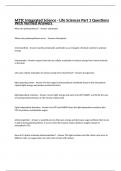
-
MTTC Integrated Science - Life Sciences Part 1 Questions With Verified Answers
- Exam (elaborations) • 16 pages • 2024
- Available in package deal
-
- $10.99
- + learn more
Who uses photosynthesis? - Answer autotrophs Where does photosynthesis occur? - Answer chloroplasts chemosyntheis - Answer used by prokaryotic autotrophs as an inorganic chemical reaction to produce energy heterotrophs - Answer require food and use cellular respiration to release energy from chemical bonds in the food who uses cellular respiration to release energy from stored food? - Answer all organisms light capturing events - Answer The first stage in photosynthesis; thylakoid...

That summary you just bought made someone very happy. Also get paid weekly? Sell your study resources on Stuvia! Discover all about earning on Stuvia


